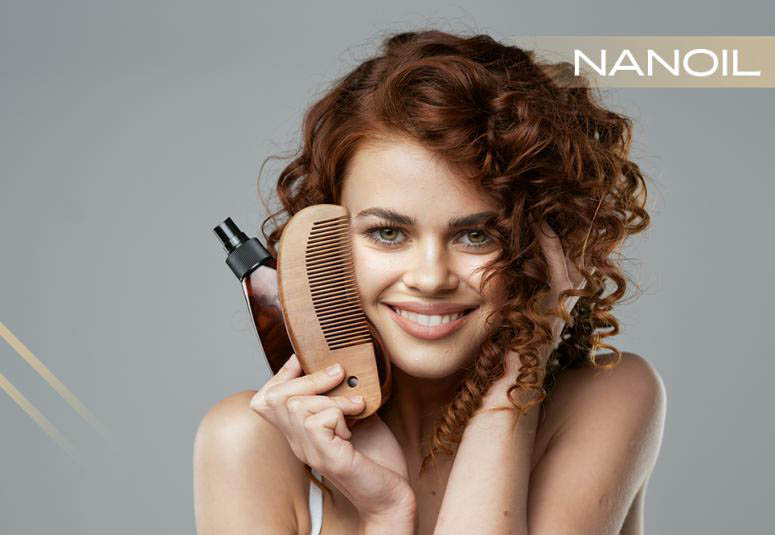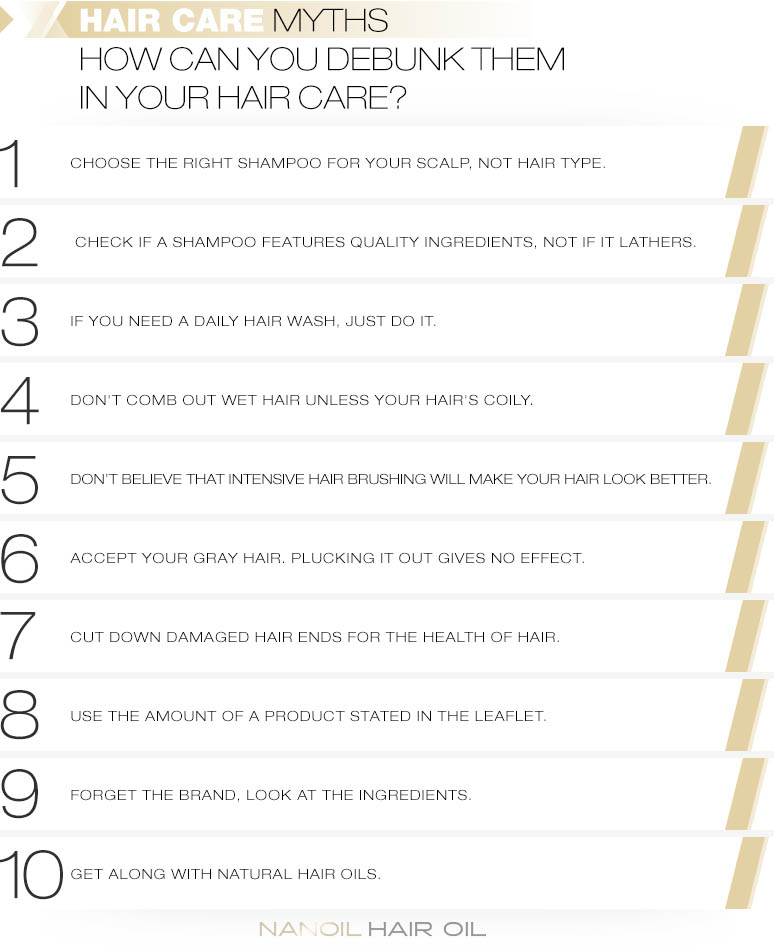- NANOIL Products
- Oils
- Face serums
- Hair masks
- Shampoos
- Hair conditioners
- Hair styling
- Care
- Hair Porosity Test
- Blog
- Contact

Is there a woman who would say no to lovely, healthy, strong hair? In the pursuit of beauty, we test various remedies but we still believe in so many hair myths. Check out the most popular lie-based hair care tips. Is there a grain of truth in any of them?
We are able to do a lot to make our hairdos amaze with shine, length and elasticity. Too bad, we often harm it following the pieces of advice coming from unreliable sources.
If sleeping with wet hair works for your friend, it doesn't mean your hair won't break as a consequence. You'd better find a better way to cut down on blow-drying. After all, wet hair is far more prone to damage.
All in all, which popular hair care tips should you forget for good?
When hair starts excessively fall out, many sufferers blame the simplest activities such as washing. A frequent hair wash which allegedly triggers hair loss, causes dryness and worsens the general condition is a widely-held and persistent myth.
It is not at all true! Actually, the right hair wash routine combined with a gentle scalp massage and with a suitable washing product is a way to improve your hair's looks. By washing daily, you promote blood flow, purify hair and scalp, reinforce bulbs and consequently (and contrary to the myth) accelerate hair growth.
However, there's a grain a truth in the myth. If you often use unsuitable products with harsh detergents, it may actually cause too many strands to fall out.
A belief that hair gets used to products is one of the most common myths cropping up in commercials. To encourage us to buy more cosmetics, brands make us believe that we really need a new shampoo as the one we use no longer works, right?
You should know that neither your hair nor scalp gets used to cosmetics. Substances work in the same way all the time, nourishing, moisturizing, repairing. The impression that a cosmetic no longer works isn't the consequence of getting used to it - it is the result of improving the hair condition. In other words, a given conditioner or shampoo no longer fulfils its role because it has already fulfilled it fixing your hair. All in all, it's time you made changes to your hair care!
This popular hair care myth refers to almost all types of cosmetics: conditioners, masks, shampoos, oils. We wrongly believe that the amount of a product translates to better effects - we think we deliver more nutrients this way. Sadly, it’s not true.
While applying any product, you must follow instructions for use! If the manufacturer measures that a drop is enough for medium-length hair, don't pour a cup of the conditioner onto your head. Applying more product than stated in the leaflet won't upgrade the effect or make it work more intensively. It also applies to another mistake we tend to make, namely, we apply conditioner to scalp when it's clearly stated that a product is designed for hair.
You neither speed up the effects nor save money - instead, you waste lots of products and - most of all - weigh down hair, clog the outlets of hair follicles and plaster the scalp.
Hair growth is caused by the proper divisions of cells in hair bulbs - nourishing substances get into the hair follicle and are synthetized into keratin. It doesn’t matter whether you cut down your hair ends or not - it has no impact on the hair growth. All essential processes happen in scalp.
Above all, there's a grain of truth in the myth - if you have hair ends trimmed regularly, your hair may seem longer and it's not because of growing at a faster pace. It's because hair doesn't break at the ends and is simply healthier.
There are a few gray hair myths. One says that a gray hair that you pull out is replaced by a new hair having a normal color. Other people, on the other hand, say that two hairs are going to grow in place of the one you plucked. What shall we believe then?
The truth is pulling a gray hair doesn't give any effect: a gray strand neither vanishes nor grows back in bigger numbers. One bulb only bears one hair so there's just one hair growing back and it will be gray too - grayness is the consequence of the loss of ability to create pigment in cells causing hair to grow. A bulb which has given a gray hair will never go back to the previous color.
Does a hair brush make hair grow more quickly and increase shine or does it work the other way round? It depends on whether you know how to brush your hair the right way. The truth is that too energetic or frequent brushing with wrong accessories may cause damage. If you want to avoid hair breakage, open cuticles and split ends, choose a comb or brush which is right for your hair type and condition.
In some cases, a brush may actually boost blood flow in scalp benefiting the hair state and appearance but you must remember to be gentle while brushing.

Some commercials promise to bind split tips back together. It is definitely a myth - cutting down damaged ends is the only way to get rid of them.
The truth is there are no cosmetics able to glue split ends back together. No mask, conditioner, serum or oil is going to do that. Some products only leave a tacky layer e.g. of silicones, making hair ends seem smoother and healthier. But it's all appearances.
Is it at all possible to fix split ends? Generally, it's not. Even though there are procedures such as Olaplex which rebuild disulfide bonds in hair and deliver essential keratin, the effect depends on how ragged your hair ends are.
I'm sure many pregnant women heard that they mustn't have their hair colored because it will harm the baby. It is a really popular myth. Lots of tests have been carried out to examine the pigment's absorption and the effect of a hair dye on the developing baby. It’s proven to be harmless. Pregnant women can freely have their hair colored, especially when they decide on natural ammonia-free dyes containing plant pigment.
You can take another helping of myths while browsing through tips on using oils in hair care. How do the ingredients actually work sand what's the result of natural oils vs mineral oil battle?
First of all, natural oils don't make hair oily if you use the right quantities and method of application. An oil going along with your hair state and type neither greases nor weighs down hair but it smoothes out, protects, locks in moisture, tames flyaways, pumps up shine and adds elasticity.
On the other hand, mineral oil doesn't have any conditioning power. Instead, it is likely to leave you with scalp irritation and dehydrated or weighed-down hair. Mineral oil has a big downside - it is not a natural cosmetic, it is a by-product of petroleum distillation. It gives a superficial effect, a temporary shine and smooth-looking hair. These effects last only until next wash.
Another hair care misconception. It should be highlighted that you mustn't comb out wet hair because it is far more prone to damage. Curls make an exception. If you go for combing wet hair, you need a quality wide-tooth comb. By doing it gently, you might avoid damage. However, whenever possible, brush your hair once it's dry.
The fact that cutting down the ends gives no growth-boosting effect doesn't mean that making hair grow more quickly is impossible! Stating that nothing can be done about the pace of hair growth is another myth.
Actually, there are lots of ways to stimulate faster hair growth. Regularly-done hair oil treatment, scrubs and scalp massage are helpful, as well as taking to fatty acid-rich foods, vitamins (especially biotin), copper and zinc.
Still, you must remember that the speed of growth has its limitations determined by our genes. You can't just magically grow 5 inches in a week.
Some people believe hair parlor products are the best which is yet another enduring myth.
In reality, professional hair salon products are not better than the ones available in stores. It's not the place that is important, it's the ingredients. Lots of store products have a truly valuable composition of nutrients which give a natural, in-depth and long-lasting effect. At the same time, many pro products equal mixture of silicones giving an instant, not durable, effect. Bear that in mind!
One of the weirdest theories says that the longer and heavier the hair, the more of it falls out. It is not true!
Obviously, there are various causes of hair loss (ranging from wrong hair care to hormone imbalance or genetics) but the weight and length don't affect the amount of hair you lose. The hair condition is much more important - long hair may turn out to fall out less than short damaged hair. You just need to remember to properly strengthen the bulbs of long hair to prime them for bearing this weight.
How do you know a quality shampoo? Many people believe that a shampoo which foams up effectively washes and removes impurities. It is another widely-held myth to debunk.
Actually, an effective shampoo doesn’t need to foam. It is important that it contains the right washing ingredients (not too harsh to avoid dehydration of hair) and substances which control functioning of sebum glands, condition scalp and re-balance its pH. Interestingly, sulfate-free shampoos often turn out to give the best effect, cleansing the most precisely.
Eventually, the last myth (shampoo-related too). Cosmetic companies have always made us buy shampoos matching the hair type: for damaged, thinning, frizzy, color-treated hair, etc. Why so? After all, a shampoo is meant for cleaning scalp.
The name 'hair shampoo' is a bit misleading. You mustn't choose a shampoo for your hair type - scalp-related problems matter more. If hair is greasy, it must be caused by disturbed functioning of sebum glands on scalp. If you're bothered by dandruff, fungi must have appeared on your scalp. It is important that you check what kind of cleansing your scalp needs because the health and looks of your hair depend on scalp, actually.
Comments: #0